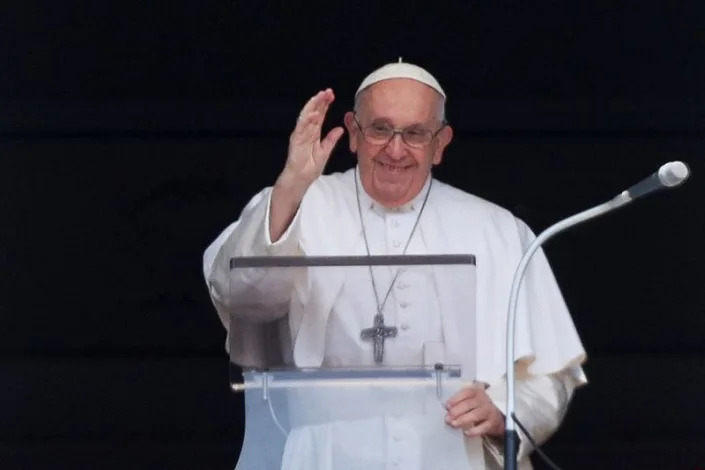
Pope Francis leads the Angelus prayer from his window at the Vatican
Tue, June 20, 2023
By Philip Pullella
VATICAN CITY (Reuters) - Pope Francis held talks on Tuesday with Cuban President Miguel Díaz-Canel, who is making a rare trip to the West, as police kept a small demonstration demanding respect for human rights on the communist-run island away from the Vatican.
A Vatican statement did not give any details on what was discussed during 40 minutes of talks but said that in Diaz-Canel´s subsequent talks with Holy See diplomats the topic was the current situation in Cuba, with particular attention to the Cuban Church's charity activities.
This appeared to be a reference to the country's dire financial situation.
Cuba is suffering a near unprecedented economic crisis, with widespread shortages of food, fuel and medicine that have prompted a record-breaking outflow of migrants to the United States in the last year.
A Cuban embassy statement said Diaz-Canel expressed support for the pope's efforts to achieve peace, protect the environment, promote nuclear disarmament and defend the poor.
Diaz-Canel, who was also due to meet Italian President Sergio Mattarella and officials of U.N. food agencies in Rome, rarely travels to Western nations. Last November, he travelled to China and Russia to meet with presidents in each country.
Pope Francis visited Cuba in 2015 and met with ailing revolutionary leader Fidel Castro, who died in 2016.
As the pope and Diaz-Canel met, about a dozen demonstrators opposed to the Cuban government held a protest near the Tiber River about six blocks away. They had planned to hold it outside St. Peter's Square but police did not allow them.
The protesters held up Cuban and Italian flags and demanded the release of those they say are political prisoners. They held up a large banner reading "Respect Human Rights in Cuba".
Communist-run Cuba has faced sharp criticism from rights groups, the United States and the European Union following the imprisonment of hundreds of protesters after the July 11, 2021, riots, the largest since Castro's 1959 revolution.
Some of those who took to the streets, angered by blackouts and shortages amid the coronavirus pandemic, cried "freedom" and demanded a change in government.
Authorities in Cuba have said those jailed following the 2021 demonstrations are guilty of crimes including public disorder, resisting arrest, robbery and vandalism. They have wavered little from those arguments despite growing international pressure.
But during an unusual visit to Cuba early this year, Cardinal Benjamin Stella, an envoy of the pope, said he had discussed a potential prisoner release with Diaz-Canel.
(This story has been refiled to add the dropped hyphenated last name of Cuban President Miguel Diaz-Canel)
(Additional reporting by David Sherwood in Havana; Editing by Christina Fincher)

No comments:
Post a Comment